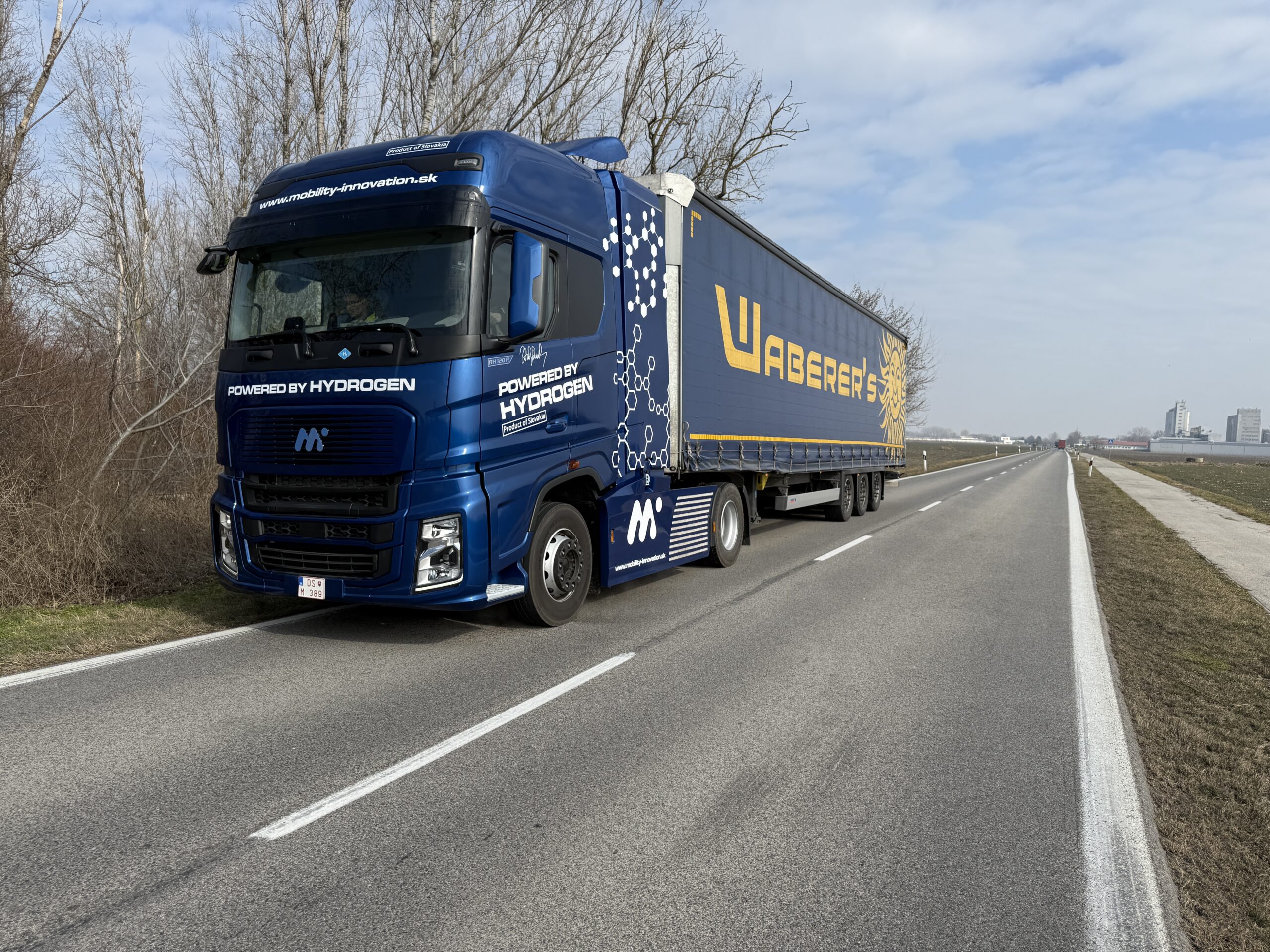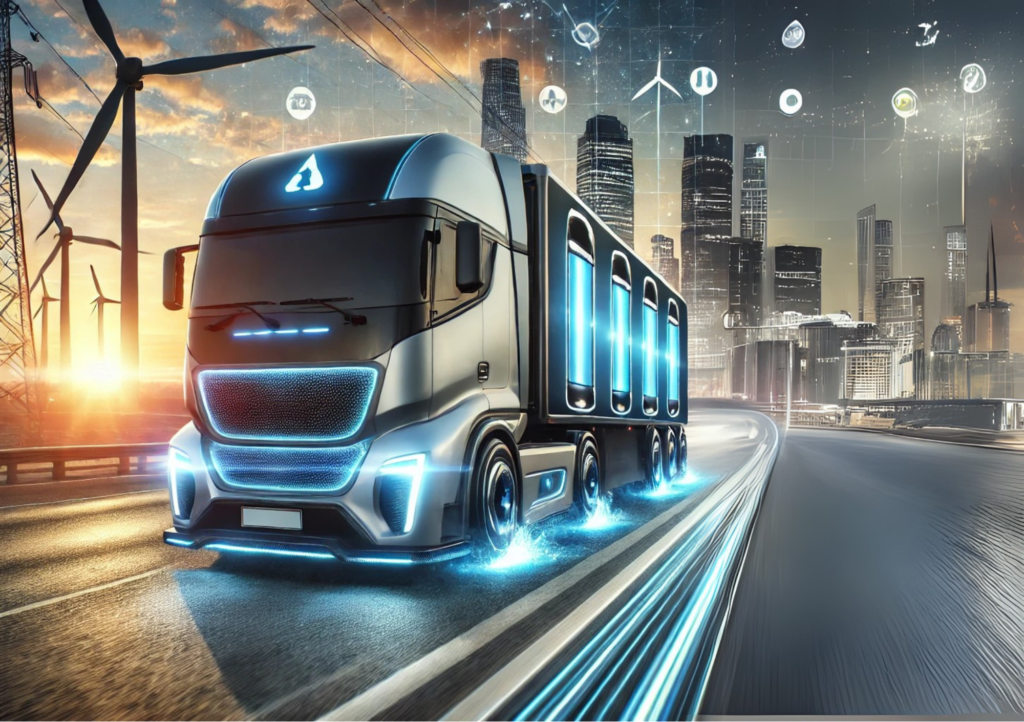How hydrogen technology is changing freight transport

Freight transport is undergoing a revolution. The challenges facing logistics companies – rising emissions standards, bans on diesel vehicles entering cities and pressure on sustainability – are opening the door to new technologies. One of the most promising is hydrogen propulsion.
Hydrogen technology, as used in vehicles such as “hydrogen cars” and hydrogen tractor-trailers, is not only a clean alternative to fossil fuels, but also a step towards transforming the entire transport sector. How exactly are these technologies changing freight transport and what does this mean for logistics companies?
1. Basic advantages of hydrogen propulsion
a) Significant reduction of emissions
Hydrogen vehicles emit no harmful emissions. Their only by-product is pure water vapour, making them the ideal choice for both urban and international transport routes.
b) Long range and fast refuelling
Hydrogen tractors, such as those being developed by Nikola Corporation, have a significantly longer range than battery electric vehicles, which is key for long-distance transport. In addition, filling time is within minutes, eliminating the wait associated with charging.
c) Versatility of use
Hydrogen propulsion is scalable for different types of vehicles – from tractors and trucks to trains and ships. This means that anything that needs long range and powerful propulsion can be powered by hydrogen.
2. Economic benefits for companies
Logistics companies that adopt hydrogen technology often benefit from lower operating costs.
a) Lower taxes and charges: in many countries, zero-emission vehicles enjoy tax breaks and lower toll charges.
b) Government subsidies: funding for the acquisition of hydrogen vehicles is often supported by government grants.
 3. Impact on infrastructure and logistics
3. Impact on infrastructure and logistics
Switching to hydrogen requires investment in infrastructure, but the benefits are long-term:
a) Building refuelling stations: as the demand for hydrogen vehicles grows, the number of stations is increasing.
b) Fleet optimisation: hydrogen technologies allow easier fleet management, especially for long-distance transport.
4. Benefits for sustainability
Hydrogen technology not only improves the ecological footprint of companies, but also contributes to global environmental goals. Switching to these technologies enables companies to:
a) Meet emission standards.
b) Increase attractiveness to environmentally conscious clients.
c) Strengthen its image as an innovator.
5. The future of hydrogen technology in transport
With the cost of hydrogen technology gradually decreasing and infrastructure investment increasing, the future of hydrogen in large transport fleets is extremely promising. In the coming years, it is expected to:
a) Growth in the availability of filling stations.
b) Innovation in hydrogen production: cheaper and greener methods of hydrogen production.
(c) Interest from governments and regulators: continuing pressures on emissions will encourage the transition to these technologies.
Summary at the end
Hydrogen technology is revolutionising freight transport. With their help, we can create a sustainable, efficient and environmentally friendly future for transport. For companies that choose to invest in these technologies today, a wide range of opportunities open up – from competitive advantage and financial relief to building a positive image in the marketplace.
If you want to know more about how to implement hydrogen technology in your business, contact us today!
Hydrogen technology, as used in vehicles such as “hydrogen cars” and hydrogen tractor-trailers, is not only a clean alternative to fossil fuels, but also a step towards transforming the entire transport sector. How exactly are these technologies changing freight transport and what does this mean for logistics companies?
1. Basic advantages of hydrogen propulsion
a) Significant reduction of emissions
Hydrogen vehicles emit no harmful emissions. Their only by-product is pure water vapour, making them the ideal choice for both urban and international transport routes.
b) Long range and fast refuelling
Hydrogen tractors, such as those being developed by Nikola Corporation, have a significantly longer range than battery electric vehicles, which is key for long-distance transport. In addition, filling time is within minutes, eliminating the wait associated with charging.
c) Versatility of use
Hydrogen propulsion is scalable for different types of vehicles – from tractors and trucks to trains and ships. This means that anything that needs long range and powerful propulsion can be powered by hydrogen.
2. Economic benefits for companies
Logistics companies that adopt hydrogen technology often benefit from lower operating costs.
a) Lower taxes and charges: in many countries, zero-emission vehicles enjoy tax breaks and lower toll charges.
b) Government subsidies: funding for the acquisition of hydrogen vehicles is often supported by government grants.
 3. Impact on infrastructure and logistics
3. Impact on infrastructure and logisticsSwitching to hydrogen requires investment in infrastructure, but the benefits are long-term:
a) Building refuelling stations: as the demand for hydrogen vehicles grows, the number of stations is increasing.
b) Fleet optimisation: hydrogen technologies allow easier fleet management, especially for long-distance transport.
4. Benefits for sustainability
Hydrogen technology not only improves the ecological footprint of companies, but also contributes to global environmental goals. Switching to these technologies enables companies to:
a) Meet emission standards.
b) Increase attractiveness to environmentally conscious clients.
c) Strengthen its image as an innovator.
5. The future of hydrogen technology in transport
With the cost of hydrogen technology gradually decreasing and infrastructure investment increasing, the future of hydrogen in large transport fleets is extremely promising. In the coming years, it is expected to:
a) Growth in the availability of filling stations.
b) Innovation in hydrogen production: cheaper and greener methods of hydrogen production.
(c) Interest from governments and regulators: continuing pressures on emissions will encourage the transition to these technologies.
Summary at the end
Hydrogen technology is revolutionising freight transport. With their help, we can create a sustainable, efficient and environmentally friendly future for transport. For companies that choose to invest in these technologies today, a wide range of opportunities open up – from competitive advantage and financial relief to building a positive image in the marketplace.
If you want to know more about how to implement hydrogen technology in your business, contact us today!